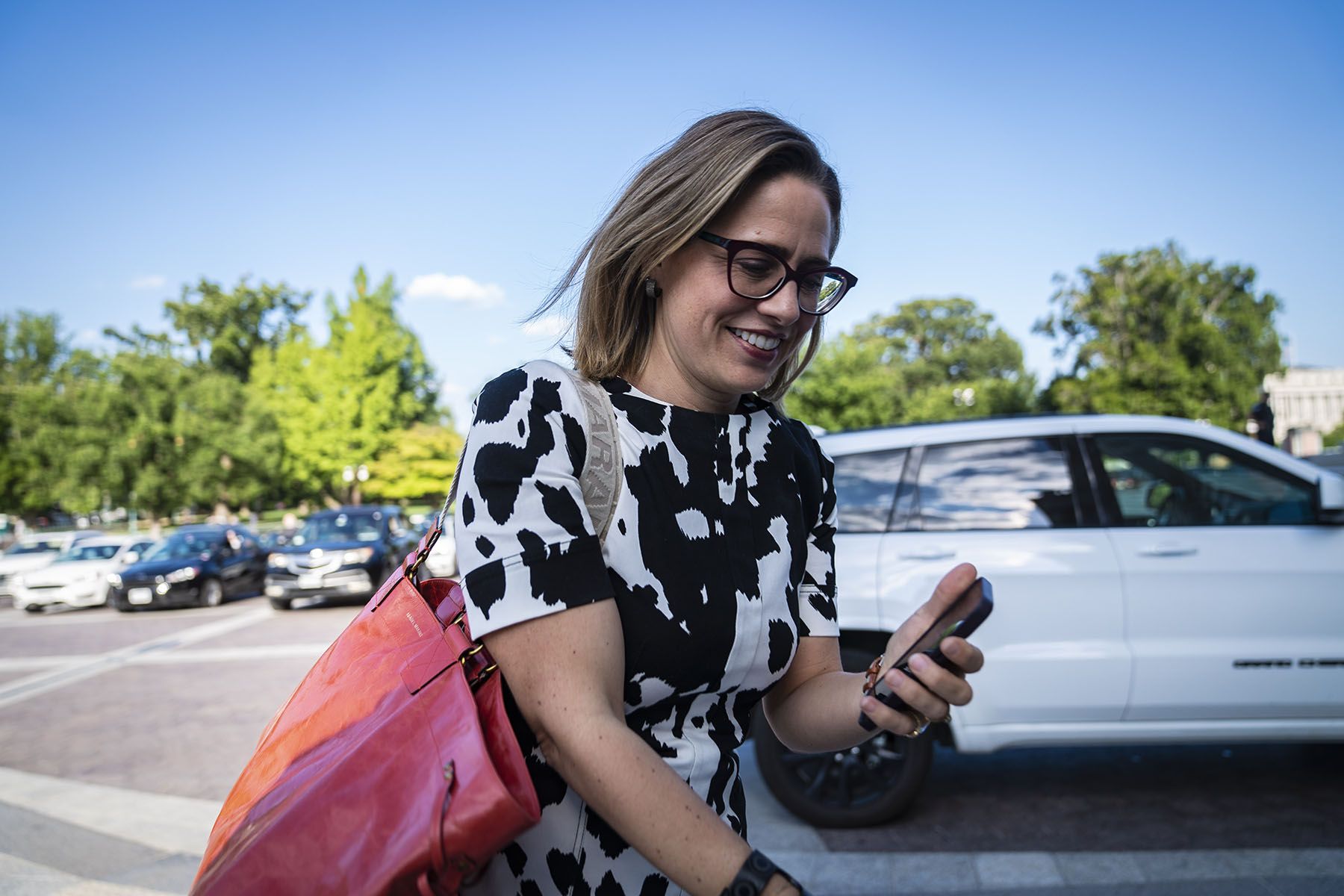Kyrsten Sinema, the first woman to represent Arizona in the U.S. Senate, said Tuesday that she will not seek reelection as an independent in what is still expected to be one of the most competitive 2024 Senate races in the country.
When Sinema, now 47, joined the Senate in 2019, she was the first Democrat to represent the state in the upper chamber in more than 20 years. In December 2022, she decided to leave the Democratic Party and became a political independent. She is the second out LGBTQ+ woman elected to Congress.
Sinema lamented in a video statement announcing that she would not seek reelection the “all-or-nothing” nature of U.S. politics — and expressed disappointment that a bipartisan infrastructure bill she helped negotiate was not received by voters from both parties as a policy victory.
“Americans still choose to retreat further to their partisan corners,” Sinema said. “These solutions are considered failures, either because they are too much, or because they are not nearly enough. It’s all or nothing, the outcome less important than beating the other guy.”
“I believe in my approach, but it’s not what Americans want right now,” she added.
Rep. Ruben Gallego, who has represented Arizona in the House of Representatives since 2015, is expected to be the Democratic nominee. Kari Lake, a newscaster-turned-politician who lost the governor’s race in 2022 to Democrat Katie Hobbs, is the front-runner for the Republican nomination.
Sinema’s 20-year political career has been marked by partisan shifts that have taken her from an anti-capitalist, Ralph Nader-supporting, anti-war protester to a Democrat who was at times seemingly cozier with the Senate GOP than her own party, to an independent.
Sinema was a social worker before she entered politics. When she first ran for office in 2002, she was a Green Party candidate for Arizona’s statehouse and finished last in a crowded field. Two years later, as a Democrat, she won a Phoenix-area statehouse district, which she represented for six years until being elected to the state Senate, where she served briefly before being elected to the U.S. House of Representatives in 2012.
Early in her time in the statehouse, Sinema said, she realized that she needed to moderate her stances to get things done. In a 2009 book that she wrote on coalition building, Sinema described her first year in the state legislature as a “bust,” so she decided to cast aside her “bomb thrower” persona and work with the Republicans, who at the time controlled both the House and Senate, along with the governor’s mansion.
In the U.S. House, Sinema joined the New Democrats Coalition and the Blue Dog Coalition, making official her centrist status. The former was founded during Democrat Bill Clinton’s presidency and promoted “Third Way” policies that skewed socially liberal but pro-business and fiscally moderate. The latter was founded around the same time, and is a group of Democrats that are in the most conservative wing of the party. After the election of Republican President Donald Trump, Sinema joined the bipartisan Problem Solvers Caucus, an outgrowth of the political group No Labels, which promotes centrist policies and has a membership split between the two major parties, as well as political independents.
Sinema announced her Senate run in September 2017. Shortly after, Republican Sen. Jeff Flake said that he would retire at the end of his first term. Flake, who had previously served in the House, was known for working across the aisle with Democrats, especially the issue of immigration. He was also an outspoken critic of Trump in the upper chamber, and he said the political climate had become so contentious within GOP circles that he would not be able to get through a Republican primary in the state.
Sinema would not debate her more progressive Democratic opponent during the Senate primary and outraised her Republican opponents by a significant margin. She rarely mentioned Trump while campaigning but went on to vote to convict him during both of his impeachment trials. Once in the Senate, during key negotiations, Sinema started aligning with Sen. Joe Manchin, a Democrat from West Virginia who is by many measures considered the most conservative member of his party in the upper chamber. Given Democrats’ slim Senate majority during her tenure, opposition from the duo was enough to sink Democratic legislation, such as a minimum wage increase in a COVID-19 relief bill, and key components of President Joe Biden’s “Build Back Better” plan. Manchin announced in November 2023 that he would not seek reelection.
Sinema continued to support abortion rights but did not believe that the Senate filibuster should be changed to pass legislation, putting her at odds with many more progressive Democrats. She also supported gun control measures that put her at odds with more centrist Democrats such as Manchin, as well as the vast majority of Republican lawmakers.
Sinema’s decision to leave the Democratic Party in December 2022 added a layer of uncertainty to Arizona’s Senate race. Progressive groups within the state were already highly critical of Sinema and a super PAC formed to oppose her. It was widely speculated that Democratic Rep. Ruben Gallego was eyeing a Senate bid, even if it meant challenging a sitting senator from his own party. Once Sinema left, Gallego announced his campaign for the Democratic nomination in January 2023.
Lake launched her Senate campaign in October 2023, having lost her gubernatorial race the year before to Hobbs by less than a percentage point. Taking a page from her mentor, Trump, Lake said that she lost the race because it was “stolen” from her. She was still casting doubt on her legitimate gubernatorial loss when she launched her Senate campaign.
Early polling shows that in a two-candidate general election, it is too close to call between Gallego and Lake. Sinema’s decision to leave the Senate should make the race easier to gauge, without a potential “spoiler” third-party candidate. Arizona has been trending blue in recent years, electing Democrat Mark Kelly in a 2020 special election to a seat that was held by Republican John McCain. The same year, Biden became the first Democratic presidential candidate to carry the state since Bill Clinton in 1996. Biden only beat Trump by less than half a percentage point, though, and Arizona remains solidly in the swing-state column.
Arizona holds its presidential primary this month. The state’s Senate primary is in early August.







